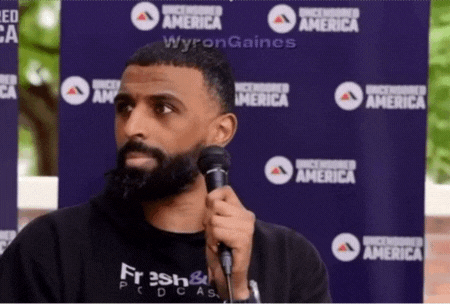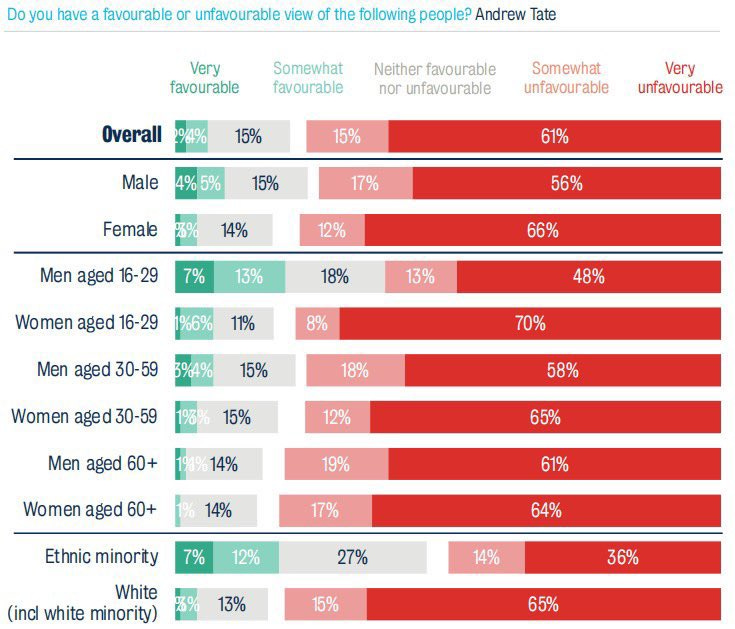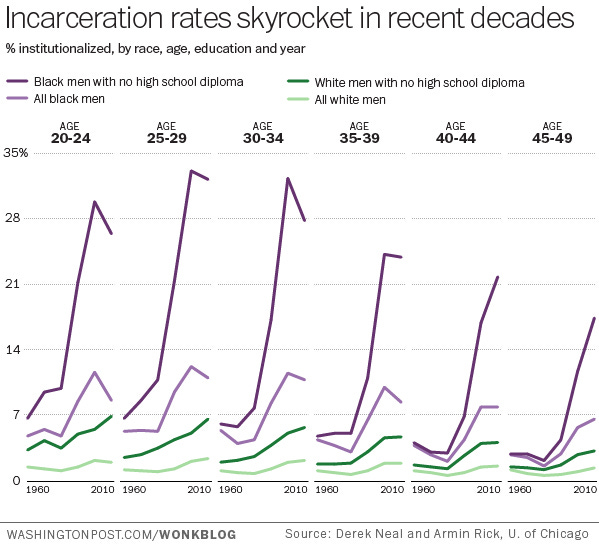Our mental sketch of an "incel" as a pasty, Cheeto-dusted basement dweller is a form of intellectual laziness, and it completely ignores the growing cohort of young men of color drawn into misogynistic content. Not only is it inaccurate, but it also reveals that many progressives discussing the issue don’t understand men, Black people, or the socio-economic realities that make this content so appealing to young men.
A recent tweet thread I came across about Andrew Tate’s viewership inspired me to write about something I’ve known for quite some time: men of color are overrepresented in the “manosphere” as both content creators and community members.
Make no mistake—the manosphere, Andrew Tate, Fresh & Fit, etc., aren’t the cause of young men’s misogyny. They’re con men, offering the laziest and most straightforward solution (externalized shame) to a generation of emasculated young men. Postmodern liberals are partly to blame for this, having ignored working-class labor instability for decades.
The popularity of this content online is merely a symptom of young men’s feelings of emasculation, resulting from the upheaval caused by our societal shift to a knowledge-based economy. If you understand the broader Black community, rather than the intelligentsia that make up the public intellectuals of the left, it’s easy to see why this content resonates with so many.
Men of all backgrounds join the “manosphere” because they feel emasculated. Young Black men are among the most emasculated groups in the country.
Just as mass industrialization brought abundance, transitioning society from agricultural models involved significant socio-economic growing pains. The working-class instability caused by rapid deindustrialization beginning in the 1970s had a profound impact on male labor forces. This, coupled with:
Women’s newfound freedoms resulting from cultural shifts enabled by birth control, abortion, and household automation
Crack and opioid epidemic (men are 2x as likely to suffer from substance addiction as women)
Mass incarceration
...has contributed to a rise in fatherless homes.
Young men today have even fewer traditional avenues for establishing a masculine identity. This identity typically includes financial stability, social respect, and romantic partnership—yet these feel increasingly out of reach. Instead of addressing why, the postmodern response has been to attempt altering cultural expectations and biological realities—an incredibly arrogant and nearly impossible feat.
The economically driven, cynical “solutions” offered by our post-postmodern, dopamine-addicted society are microdoses of traditional masculine achievements, cheap highs like pornography and video games. En masse, we’ve tried these two models for decades. Now, young men are eager for something new. And right-wing reactionary ideologies, offering both an explanation (displaced blame) and a sense of community, are ready to provide it.
(Employment share in manufacturing, males, All men vs Black men 25-55)
The economic trajectory of Black Americans from slavery through the Civil Rights era illustrates how industrial opportunity created pathways to economic dignity. But deindustrialization hit Black communities first and hardest. The manufacturing jobs that once provided stable incomes without requiring higher education vanished, leaving urban centers economically hollowed out.
This economic collapse combined with the devastating impacts of the crack epidemic and mass incarceration policies that disproportionately impacted Black men(and their sons). By the 1990s, expressions of Black masculinity in popular culture increasingly reflected these pressures.
“Bitches ain't shit but hoes and tricks,
Lick on these nuts and suck the dick.”
Dr. Dre (Bitches Ain’t Shit, 1993)
Much of NWA’s music, and many popular rap lyrics, could have been pulled straight from a manosphere video or incel forum. While popular culture hypersexualizes Black masculinity, economic structures simultaneously undermine Black male autonomy, a contradiction that creates profound identity dissonance.
This disaffection among Black men served as an early indicator of the broader post-industrial masculine identity crisis now affecting white communities as well.
If you’ve had the displeasure of watching manosphere content, you’ll quickly notice something distinct about the Black manosphere segments: their grievances are often racially targeted toward Black women. Although they echo the same talking points as the broader incel, manosphere, and redpill communities, they usually preface them with a caveat—framing the issue as specific to Black women rather than women in general.
In communities of fatherless young men, it makes sense that the maternal figure—present and familiar—is more often blamed than the absent or inconsistent father, their same-sex parent. Black women are also the closest figures in their lives, and those who adopt a victim identity often direct blame toward those closest to them.
These surface-level differences mask a shared underlying psychology: displaced rage at perceived emasculation, channeled toward women instead of the economic systems that constrain male opportunity.
With this hostility comes a rising rate of femicide that disproportionately impacts Black women. Yet it enjoys relative immunity from criticism, both from leftist activists and even Black progressives who fall into the trap of prioritizing racial solidarity over confronting internal, sex-based oppression.
When we promote the (inaccurate) image of an incel as a young, white, crusty male, we inadvertently ignore the growing prevalence of young Black men in misogynistic spaces and the violence their feelings of emasculation can enable. We also do a disservice to these young men by overlooking the dire conditions that shape their lives.
The overrepresentation of men of color in these spaces should prompt a deeper examination of how economic precarity, not just cultural messaging, fuels misogynistic ideologies.
For Black women, this conversation cannot remain an academic exercise; it must be a practical one. The violence enabled by these ideologies doesn't just happen on message boards. It manifests in real-world relationships, workplaces, and public spaces. Confronting incel culture means acknowledging its complex, intersectional reality, not simplifying it into a purely white phenomenon. It also challenges progressives to move beyond a zero-sum view of suffering.







Amen. Great stuff. I brought up the connection between illiteracy and the manosphere in this post. https://cathyreisenwitz.substack.com/p/the-manosphere-vs-the-illiterati And Black boys are more likely to be illiterate than white ones, all else equal.
This was eye opening thank you